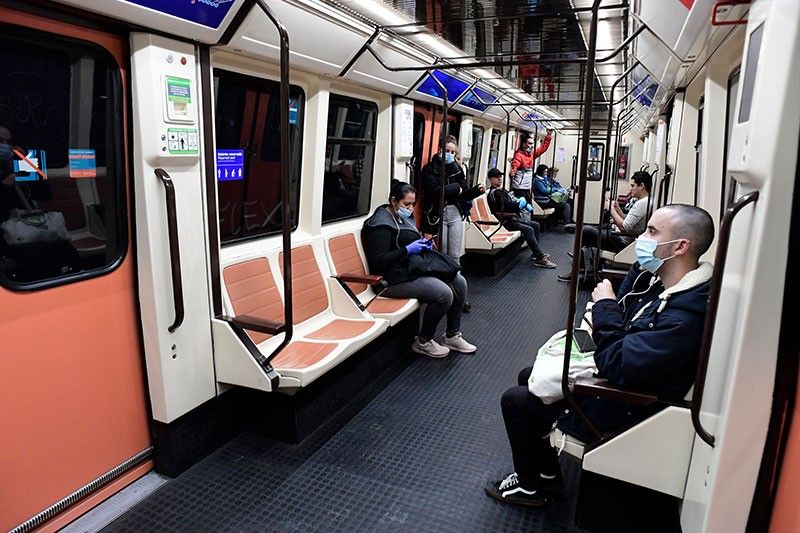On-off social distancing may be needed until 2022 — Harvard study

WASHINGTON, United States — A one-time lockdown won't halt the novel coronavirus and repeated periods of social distancing may be required into 2022 to prevent hospitals from being overwhelmed, Harvard scientists who modeled the pandemic's trajectory said Tuesday.
Their study comes as the US enters the peak of its COVID-19 caseload and states eye an eventual easing of tough lockdown measures.
The Harvard team's computer simulation, which was published in a paper in the journal Science, assumed that COVID-19 will become seasonal, like closely related coronaviruses that cause the common cold, with higher transmission rates in colder months.
But much remains unknown, including the level of immunity acquired by previous infection and how long it lasts, the authors said.
"We found that one-time social distancing measures are likely to be insufficient to maintain the incidence of SARS-CoV-2 within the limits of critical care capacity in the United States," lead author Stephen Kissler said in a call with reporters.
"What seems to be necessary in the absence of other sorts of treatments are intermittent social distancing periods," he added.
Widespread viral testing would be required in order to determine when the thresholds to re-trigger distancing are crossed, said the authors.
The duration and intensity of lockdowns can be relaxed as treatments and vaccines become available. But in their absence, on and then off distancing would give hospitals time to increase critical care capacity to cater for the surge in cases that would occur when the measures are eased.
"By permitting periods of transmission that reach higher prevalence than otherwise would be possible, they allow an accelerated acquisition of herd immunity," said co-author Marc Lipsitch.
Conversely, too much social distancing without respite can be a bad thing. Under one modeled scenario "the social distancing was so effective that virtually no population immunity is built," the paper said, hence the need for an intermittent approach.
The authors acknowledged a major drawback in their model is how little we currently know about how strong a previously infected person's immunity is and how long it lasts.
Virus likely here to stay
At present the best guesses based on closely-related coronaviruses are that it will confer some immunity, for up to about a year. There might also be some cross-protective immunity against COVID-19 if a person is infected by a common cold-causing betacoronavirus.
One thing however is almost certain: the virus is here to stay. The team said it was highly unlikely that immunity will be strong enough and last long enough that COVID-19 will die out after an initial wave, as was the case with the SARS outbreak of 2002-2003.
Antibody tests that have just entered the market and look for whether a person has been previously infected will be crucial in answering these vital questions about immunity, they argued, and a vaccine remains the ultimate weapon.
Outside experts praised the paper even as they emphasized how much remained unknown.
"This is an excellent study that uses mathematical models to explore the dynamics of COVID-19 over a period of several years, in contrast to previously published studies that have focused on the coming weeks or months," Mark Woolhouse, an infectious disease epidemiologist at the University of Edinburgh said.
"It is important to recognize that it is a model; it is consistent with current data but is nonetheless based on a series of assumptions -- for example about acquired immunity -- that are yet to be confirmed."
Follow this page for updates on a mysterious pneumonia outbreak that has struck dozens of people in China.
New Zealand Prime Minister Chris Hipkins says on Sunday that he had contracted COVID-19, testing positive at a key point in his flailing campaign for re-election.
Hipkins saYS on his official social media feed that he would need to isolate for up to five days -- less than two weeks before his country's general election.
The leader of the centre-left Labour Party said he started to experience cold symptoms on Saturday and had cancelled most of his weekend engagements. — AFP
The World Health Organization and US health authorities say Friday they are closely monitoring a new variant of COVID-19, although the potential impact of BA.2.86 is currently unknown.
The WHO classified the new variant as one under surveillance "due to the large number (more than 30) of spike gene mutations it carries", it wrote in a bulletin about the pandemic late Thursday.
So far, the variant has only been detected in Israel, Denmark and the United States. — AFP
The World Health Organization says on Friday that the number of new COVID-19 cases reported worldwide rose by 80% in the last month, days after designating a new "variant of interest".
The WHO declared in May that Covid is no longer a global health emergency, but has warned that the virus will continue to circulate and mutate, causing occasional spikes in infections, hospitalisations and deaths.
In its weekly update, the UN agency said that nations reported nearly 1.5 million new cases from July 10 to August 6, an 80% increase compared to the previous 28 days. — AFP
The head of US intelligence says that there was no evidence that the COVID-19 virus was created in the Chinese government's Wuhan research lab.
In a declassified report, the Office of the Director of National Intelligence (ODNI) says they had no information backing recent claims that three scientists at the lab were some of the very first infected with COVID-19 and may have created the virus themselves.
Drawing on intelligence collected by various member agencies of the US intelligence community (IC), the ODNI report says some scientists at the Wuhan lab had done genetic engineering of coronaviruses similar to COVID-19. — AFP
Boris Johnson deliberately misled MPs over Covid lockdown-breaking parties in Downing Street when he was prime minister, a UK parliament committee ruled on Thursday.
The cross-party Privileges Committee said Johnson, 58, would have been suspended as an MP for 90 days for "repeated contempts (of parliament) and for seeking to undermine the parliamentary process".
But he avoided any formal sanction by his peers in the House of Commons by resigning as an MP last week.
In his resignation statement last Friday, Johnson pre-empted publication of the committee's conclusions, claiming a political stitch-up, even though the body has a majority from his own party.
He was unrepentant again on Thursday, accusing the committee of being "anti-democratic... to bring about what is intended to be the final knife-thrust in a protracted political assassination".
Calling it "beneath contempt", he said it was "for the people of this to decide who sits in parliament, not Harriet Harman", the veteran opposition Labour MP who chaired the seven-person committee. — AFP
- Latest
- Trending
































